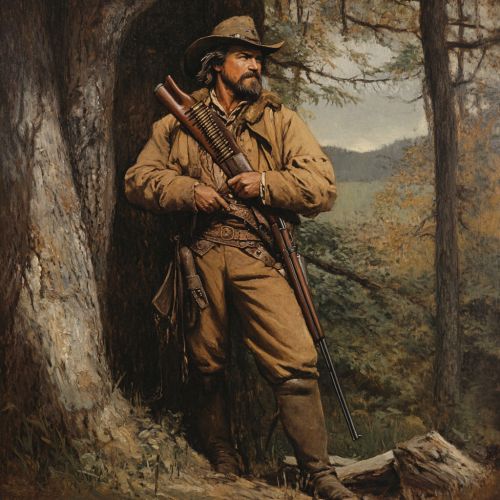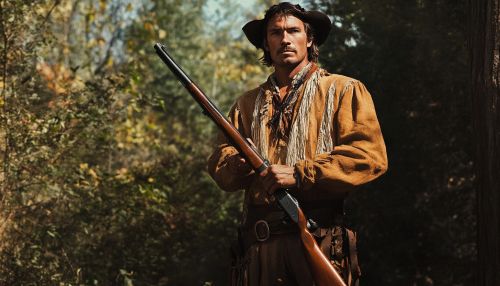Daniel Boone: Difference between revisions
(Created page with "== Early Life and Background == Daniel Boone was born on November 2, 1734, in a log cabin in the Oley Valley, near present-day Reading, Pennsylvania. He was the sixth of eleven children born to Squire Boone and Sarah Morgan. The Boone family were Quakers, a religious group known for their pacifism and simple living. However, due to a conflict with the local Quaker community, the Boones were expelled, prompting them to move to the Yadkin Valley in North Carolina in 1750....") |
No edit summary |
||
| Line 11: | Line 11: | ||
Boone's exploration of Kentucky was not without challenges. The region was inhabited by various Native American tribes, including the Shawnee and Cherokee, who resisted European encroachment on their lands. Boone was captured by the Shawnee in 1778 but managed to escape after several months. Despite these dangers, Boone continued to promote settlement in Kentucky, leading to the establishment of Boonesborough, one of the first American settlements west of the Appalachians. | Boone's exploration of Kentucky was not without challenges. The region was inhabited by various Native American tribes, including the Shawnee and Cherokee, who resisted European encroachment on their lands. Boone was captured by the Shawnee in 1778 but managed to escape after several months. Despite these dangers, Boone continued to promote settlement in Kentucky, leading to the establishment of Boonesborough, one of the first American settlements west of the Appalachians. | ||
[[Image:Detail-99403.jpg|thumb|center|Portrait of Daniel Boone in frontier attire, standing in a wooded area with a rifle.|class=only_on_mobile]] | |||
[[Image:Detail-99404.jpg|thumb|center|Portrait of Daniel Boone in frontier attire, standing in a wooded area with a rifle.|class=only_on_desktop]] | |||
== Role in the American Revolutionary War == | == Role in the American Revolutionary War == | ||
Latest revision as of 17:59, 29 October 2024
Early Life and Background
Daniel Boone was born on November 2, 1734, in a log cabin in the Oley Valley, near present-day Reading, Pennsylvania. He was the sixth of eleven children born to Squire Boone and Sarah Morgan. The Boone family were Quakers, a religious group known for their pacifism and simple living. However, due to a conflict with the local Quaker community, the Boones were expelled, prompting them to move to the Yadkin Valley in North Carolina in 1750.
Boone's early life was marked by a love for the outdoors and a keen interest in hunting and exploration. His father taught him basic survival skills, including tracking and trapping, which would later become essential in his career as a frontiersman. Boone's education was informal, primarily focused on practical skills rather than formal schooling.
Exploration and Settlement of Kentucky
Daniel Boone is best known for his exploration and settlement of what is now Kentucky. In 1767, Boone first ventured into Kentucky on a hunting expedition, but it wasn't until 1769 that he embarked on a more significant journey. Along with a small group of men, Boone blazed a trail through the Cumberland Gap, a natural pass through the Appalachian Mountains, which became known as the Wilderness Road. This route would later serve as a critical pathway for westward expansion.
Boone's exploration of Kentucky was not without challenges. The region was inhabited by various Native American tribes, including the Shawnee and Cherokee, who resisted European encroachment on their lands. Boone was captured by the Shawnee in 1778 but managed to escape after several months. Despite these dangers, Boone continued to promote settlement in Kentucky, leading to the establishment of Boonesborough, one of the first American settlements west of the Appalachians.


Role in the American Revolutionary War
During the American Revolutionary War, Boone's knowledge of the frontier and his leadership skills were invaluable. He served as a militia officer in the Virginia militia, participating in several key battles against British forces and their Native American allies. Boone's most notable contribution was during the Siege of Boonesborough in 1778, where he helped defend the settlement against a combined force of British soldiers and Shawnee warriors.
Despite his efforts, Boone faced accusations of treason after his escape from Shawnee captivity. He was court-martialed but ultimately acquitted, with his reputation largely restored. Boone's experiences during the war highlighted the complex relationships between European settlers and Native American tribes, as well as the strategic importance of frontier regions in the conflict.
Later Life and Legacy
After the Revolutionary War, Boone continued to explore and settle new territories. In 1799, he moved to Missouri, then part of Spanish Louisiana, where he received a land grant. Boone spent his later years in Missouri, engaging in hunting and trapping until his death on September 26, 1820.
Daniel Boone's legacy as a pioneer and explorer is well-established in American history. He became a folk hero, celebrated in literature and popular culture for his adventurous spirit and contributions to westward expansion. Boone's life and exploits were romanticized in various accounts, including John Filson's "The Adventures of Colonel Daniel Boon," which contributed to his legendary status.
Cultural Impact and Representation
Boone's image as a rugged frontiersman has been immortalized in various forms of media. He was the subject of numerous books, plays, and films, often depicted wearing a coonskin cap, although historical evidence suggests he preferred a wide-brimmed hat. Boone's portrayal in popular culture reflects the American ideal of the self-reliant pioneer, embodying themes of exploration, independence, and resilience.
The Boone legend has also been scrutinized by historians, who have sought to separate fact from fiction in his life story. While Boone's achievements were significant, they have sometimes been exaggerated or mythologized, contributing to a complex and multifaceted legacy.
